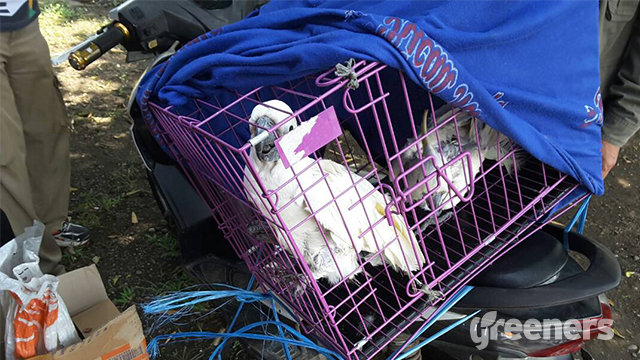Jakarta (Greeners) – Ministry of Environment and Forestry and police arrested two illegal wildlife traffickers through social media.
Head of Law Enforcement Agency Region Java Bali Nusa Tenggara, Benny Bastiawan, said that the first one, AN (20), was arrested with two yellow-crested cockatoos (Cacatua sulphurea), two forest cat (Felis bengalensis) and one pangolin (Manis javanicus).
“AN is a college student and resides in Neglasari village, Bojong Picung subdistrict of Cianjur. AN is suspected to be the dealer or animal trader for protected animals,” said Bastiawan in Jakarta, on Friday (16/6).
READ ALSO: Wildlife Domestication Goes Unpunished in Indonesia
Second trader, DR (30), a Waru Doyong villager of Cikalong Kulon, Cianjur, was arrested with an offset bearcat (Arctictis binturong) and 15 not protected animals, — seven Asian palm civet (Paradokurus hermaphroditus), one small-toothed palm civet (Arctogalidia trivirgata), five sugar gliders (Petaurus breviceps), one buffy fish owl (Ketupa ketupu) and one small Asian mongoose (Herpetes javanicus).
Furthermore, Bastiawan said that the arrest resulted from public information on illegal wildlife trading conducted through social media which was followed up by West Java Task Force on Plant and Animal Evacuation and Rescue.
“The arrest was in Waru Doyong village, Cikalong Kulon subdistrict, Cianjur district, West Java province. Both traders were under investigation in Cianjur police station for developing the case of illegal wildlife trading through social media,” he said.
READ ALSO: Money Laundering Will Be Added to Tackle Illegal Wildlife Trading
Meanwhile, Director General of Law Enforcement at Ministry of Environment and Forestry, Rasio Ridho Sani, said that illegal wildlife trading was done openly in public despite of the ministry’s campaign on protected and saving protected animals through social media.
Both traders, said Sani, were subject to law issued in 1999 and could face five years in prison and one hundred million rupiah of fine.
“We are hoping for people to continue cooperate and deliver information on illegally domesticated animals or wildlife trading,” he underlines.
Reports by Danny Kosasih



















































